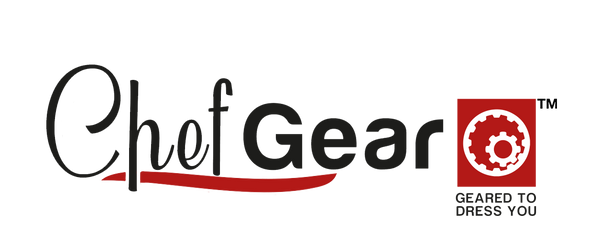Chef's Toolkit: Must-Know Skills and Insights for Aspiring Culinary Professionals
Are you a budding culinary artist, yearning to conquer the world of flavours and textures? Do you aspire to master the art of creating culinary delights that leave diners raving?
To achieve your dreams in the competitive culinary industry, you need more than a passion for food. You need a well-stocked toolkit of skills, insights, and know-how.
In this article, Chef Gear explores the essential elements of a chef's toolkit that aspiring culinary professionals should master.
1. Knife Skills: The Foundation of Culinary Craftsmanship
Every great chef starts with the basics, and in the culinary world, it doesn't get more fundamental than knife skills. The way you handle a knife can make a profound difference in the final presentation and taste of your dishes.
Learn to dice, chop, julienne, and fillet with precision. A sharp knife in the hands of a skilled chef is a formidable tool.
2. Palate Perfection: Developing Your Sense of Taste
A chef's palette isn't just for painting; it's for tasting. To create exceptional dishes, you must cultivate your palate. Train your taste buds to detect subtle nuances in flavour and understand the principles of flavour balancing, such as sweet, sour, salty, and bitter. This skill is the compass that guides you through the labyrinth of ingredients.
3. The Art of Timing: Mastering Culinary Techniques
Timing is everything in the kitchen. Whether it's searing a steak to perfection or timing the boil on your pasta, understanding cooking techniques is crucial. Learn the art of sautéing, roasting, braising, and poaching. Each technique requires precise timing and temperature control.
| SHOP CHEF GEAR ONLINE
 |
 |
 |
 |
 |
 |
4. Ingredient Knowledge: The Power of Freshness
A great chef knows that quality ingredients are the heart of every fantastic dish. Familiarize yourself with different ingredients, their seasonality, and their best uses. Visit local markets, and get to know your suppliers. Freshness makes all the difference.
5. Menu Planning: Creating Culinary Harmony
A well-crafted menu is like a symphony of flavors. As a chef, you must know how to create a balanced and appealing menu. Understand how to pair flavors, create complementary dishes, and cater to various dietary needs and preferences.
6. Creativity and Innovation: Expressing Your Culinary Identity
The culinary world thrives on innovation. Don't be afraid to experiment and push the boundaries of traditional recipes. Your unique touch is what will set you apart. Your culinary identity is your brand.
7. Hygiene and Safety: Non-Negotiable Practices
In a professional kitchen, hygiene and safety are paramount. Understand food safety protocols, cross-contamination prevention, and best practices for kitchen cleanliness. This knowledge isn't just about quality; it's about health and trust.
8. Organisation and Time Management: Maintaining Kitchen Harmony
In a bustling kitchen, chaos can reign if you're not organised. Learn to plan your tasks, prep in advance, and manage your time effectively. An organised chef is a calm chef.

9. Crisis Management: Handling Kitchen Emergencies
In the heat of the kitchen, unexpected challenges can arise. Whether it's a sudden shortage of ingredients or a malfunctioning appliance, you must stay cool under pressure and adapt to changing circumstances.
10. Resilience and Persistence: The Path to Culinary Success
A culinary career is demanding, with long hours and high-pressure situations. To succeed, you need resilience and persistence. Keep honing your skills, learning from your mistakes, and pushing through the challenges.
Insights from Industry Professionals
To enrich your culinary toolkit, it's vital to seek insights and wisdom from those who've walked the path. Many accomplished chefs are eager to share their experiences and expertise.
- Mentorship: Consider finding a mentor in the culinary world. A mentor can provide invaluable guidance, feedback, and opportunities for growth.
- Continuous Learning: Culinary trends evolve, and staying updated is essential. Attend workshops, seminars, and culinary courses to expand your knowledge.
- Networking: The culinary community is vast, and networking can open doors to exciting opportunities. Connect with fellow chefs, attend industry events, and engage in online culinary forums.
-
Stay Inspired: Visit different restaurants, try diverse cuisines, and read culinary literature. Inspiration can come from various sources, so keep an open mind.
Outfitting Your Culinary Journey with Chef Gear
Just as a painter needs quality brushes and a musician needs a finely tuned instrument, a chef needs the right tools.
Chef Gear, a renowned name in culinary apparel, offers a range of high-quality products designed to complement your culinary journey.
A well-made chef uniform isn't just about appearance; it's about comfort, functionality, and safety. Chef Gear's line of chef uniforms combines style and durability, ensuring you look and feel your best in the kitchen.
Chef Gear offers a variety of accessories, from hats to aprons. These small details can make a big difference in your overall comfort and appearance in the kitchen.
Personalise your chef uniform with your name or logo. This extra touch adds uniqueness to your uniform and reinforces your professional image.
With the right skills, insights, and quality chef gear from Chef Gear, you're well-equipped to embark on a successful culinary journey.
Remember, it's not just about the destination; it's about the joy of the culinary voyage itself. Happy cooking!



0 comments